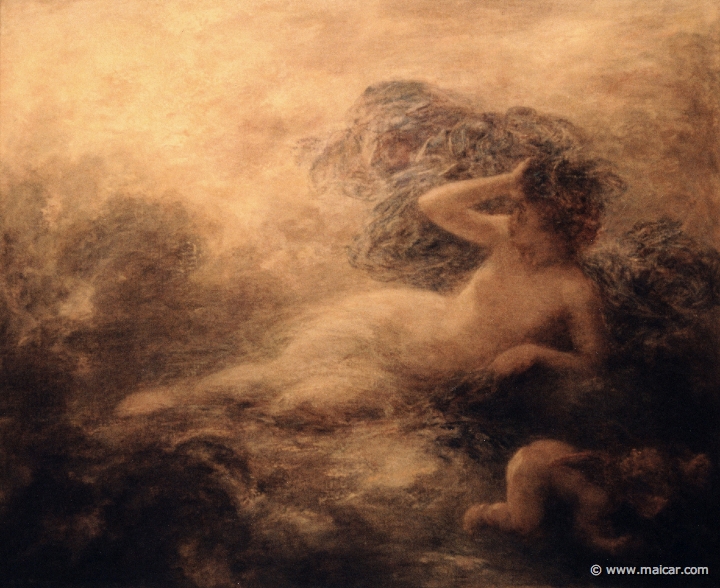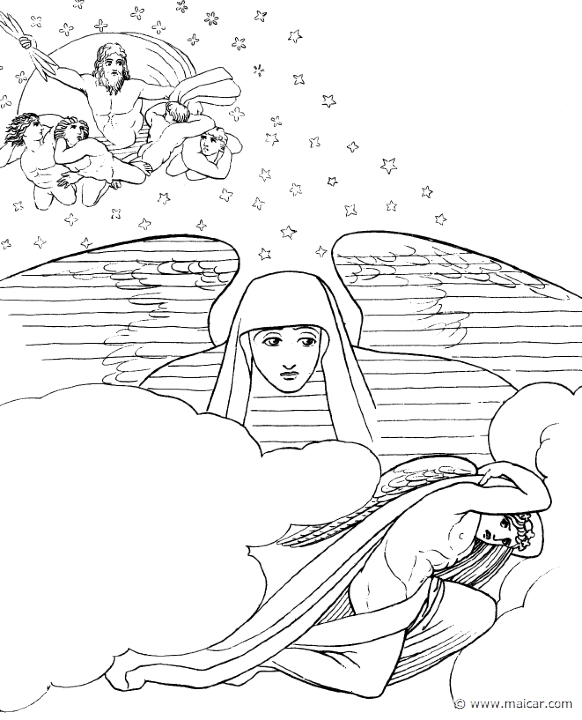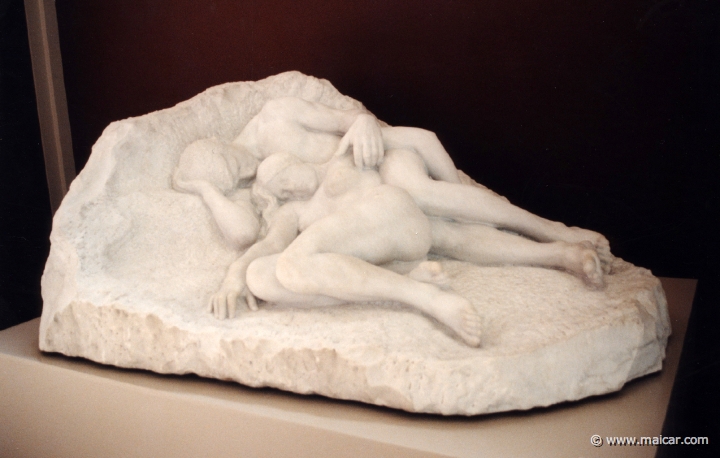|

|
Nyx. 5012: Henri Fautin-Latour 1836-1904: Night 1897. Musée d'Orsay, Paris.
|
|
|
Eteocles 1: Suppose we fall on them by night from ambush?
Creon 2: Yes, if in the event of defeat you can return safely here.
Eteocles 1: Night equalizes risks, though it rather favors daring.
Creon 2: The darkness of night is a terrible time to suffer disaster.
Eteocles 1: Well, shall I attack them as they sit at dinner? (Euripides, Phoenician Women 725).
"Who are these who come near my couch in the night? … Is there some midnight ambush?" (Hector 1. Euripides, Rhesus 14ff.).
"Starry night does not remain constant with men, nor does tribulation, nor wealth; in a moment it is gone from us, and to another in his turn come both gladness and bereavement." (The Trachinian women to Deianira 1. Sophocles, Trachinian Women 135).
"…tous les événements d'importance doivent avoir lieu la nuit… Quand le manteaux des ténèbres recouvre l'univers, les esprits et toutes les forces mystérieuses, qui ne veulent pas être dérangées par la présence des hommes, entrent en action." (Styn Streuvels, 1871-1969).
|
|
Nyx is Night.
Powerful goddess
Black winged Nyx, some say, laid a germless egg
in the infinite bosom of Erebus, the Darkness of
the Underworld, and
after long ages, sprang golden-winged Eros. But others have said
that Nyx is the daughter of Eros, whereas others called
both of them children of Chaos. Nyx is Night, a powerful goddess whose dark light falls from the stars, and who dictates not only to men but also to gods. Even Zeus does not wish to upset Night: It happened that Hera bribed Hypnos in order to
make Zeus fall asleep, so
that she could have it her way during the Trojan War. Hypnos obeyed the goddess
in spite of his fears; for once he had performed a
similar task, and when Zeus woke up in anger, he sought him everywhere, and
would have hurled him from heaven into the deep,
had Nyx not saved him. For Zeus stopped and thought
twice before doing anything that could displease
Nyx. Some seem to think that Nyx appears because
light is gone as if anything could be and yet do
not exist on its own right. But when counting the
days, not seldom the nights are mentioned first as
when it is said:
"… a brazen anvil falling down from heaven nine nights and days would reach the earth upon the tenth: and again, a brazen anvil falling from earth nine nights and days would reach Tartarus upon the tenth." (Hesiod, Theogony 725).
Nyx's home
In Tartarus, both a place and her brother, Nyx
has her home and spreads around him in triple line
like a necklace. At the gates of Tartarus and above
it are the sources and ends of heaven, earth and
sea, and it is told that if a man should find
himself inside the gates, he would not reach the
bottom for one year, being carried by blasts in all
directions.
Portion of Time
But although it could be said that the days
could not be counted if this dark-robed goddess,
giver of sleep, would not come between them, night
and day are, in a certain way, equals:
"… night's sightless eye, and radiant sun proceed upon their yearly course on equal terms and neither of them is envious when it has to yield." (Jocasta to her sons. Euripides, Phoenician
Women 543).
For the world, they say, is the movable image of
Eternity, and when the heavens were constructed,
there appeared after them Night and Day, the months
and the years, being all portions of Time, which imitates
Eternity. Both Day and Night live in the same home behind
the brazen threshold of Tartarus, never being there
at the same time, for when one of them crosses the
earth the other waits at home. But they greet each
other at the threshold as they cross in front of
the place where Atlas holds up heaven.
|

|
Nyx protecting Hypnos | il263flax: "But Zeus, when he awakened, was wroth, and flung the gods hither and thither about his palace, and me above all he sought, and would have hurled me from heaven into the deep to be no more seen, had Night not saved me — Night that bends to her sway both gods and men." (Hom.Il.14.255). John Flaxman (1755 – 1826).
|
|
Favours mischief
Nyx is highly appreciated and revered by those
who cast snares, for mischief and treachery not
seldom arise from night-time, when things are often
unexpected, although Destruction is believed to
make its way in any case:
"If night
leaves anything undone in the working of
destruction, day follows to accomplish it." (Sophocles, Oedipus
the King 196).
So Cronos, protected
by the darkness of the night, attacked his father Uranus from an ambush,
castrating him with the sickle of the jagged teeth.
And it was in night-time that Heracles 1 surprised his enemies and took the island of Cos, which is off the southwestern coast of Asia Minor, slaying King Eurypylus 4. During the Trojan
War it was Night who protected the comings and
goings of spies, for it was protected by the
darkness of immortal Night that Odysseus entered,
disguised as a beggar, the city of Troy; and it was during the
night that the Thracian Rhesus 2 met his death
attacked by Odysseus and Diomedes 2. And it was also in night-time that the Achaeans pretended to return home, burning their own tents and waiting with their fleet off the island of Tenedos, which is opposite the coast of the Troad, in order to stealthily sail back disguised by the shades of the following night. This time true beacon lamps, lighted by Sinon, and some say by Helen, guided them, so
that they could land and take Troy, which fell by night,
but on another night during their returns, the ACHAEAN LEADERS suffered shipwreck because of the false beacon lamps, lighted by Nauplius 1, the father of Palamedes.
Fugitives like her
Also those who escape, commit thefts and other
crimes, prefer to do it by night, for this is the
time for Deceit, Sleep, Doom, Madness and Death, although no one
knows how the children of Nyx will play. That is
why Medea guided Jason to the Golden Fleece
by night, lulling to sleep the guardian dragon by
drugs, and by night the ARGONAUTS left
Colchis, taking with them the king's daughter.
Helen appreciated her
When Helen and Paris left Sparta as lovers and
sailed to Troy, they
started their fateful journey by night, and when
she returned after the war, they say that she
waited for the night to go out in order to avoid
being stoned, if she went out by day, by the
parents whose sons had perished at Troy. For Helen was called "Lady of Sorrows" for having caused, as they saw it, that great war. But during the night she was safe, not only because Night provides hiding but also because the others mourned, for tears are shed mostly in night-time.
Remembered meeting
It was on one certain night that Tydeus 2 and Polynices had a fight in front of the house of King Adrastus 1, waking him up; and from the meeting of these three men came out the alliance of the SEVEN AGAINST
THEBES, an unforgettable moment for those
involved:
"It was night
when I reached the porch of Adrastus." (Polynices to Jocasta. Euripides, Phoenician
Women 415).
Love and Deceit
The DANAIDS deemed
their wedding night to be the best moment to murder
their husbands, for Love and Deceit, being both children of Night, cannot be
properly distinguished from each other when
darkness has come, since night-time distorts
perception.
Heracles 1's night
blindness
That experienced Heracles 1, who
mistook at night for living the portrait statue
that Daedalus had made of him in return for having buried the body of his son Icarus 1, and throwing a stone, hit it.
Night covers shame, spares lives
And the guilty love of Adonis' mother Smyrna for
her father could not have occurred without Night,
for only her dark power and her child Deceit could
prevent her father from knowing that he was sharing
his bed with his daughter, which he did no less
than twelve times. And even if war does not need to stop in
night-time, Nyx is also known for parting warriors,
thus sparing lives, for the heralds interrupted the
duel between Ajax 1 and Hector 1 when it became
dark, saying:
"… night is now upon us, and it is well to yield obedience to night's behest." (Homer, Iliad 7.282).
And those who are fortunate do not wish the day
to end, but those who are endangered during the
hours of light welcome Night as a blessed relief:
"Sorely
against the will of the Trojans sank the daylight,
but over the Achaeans welcome, aye,
thrice-prayed-for, came the darkness of
night." (Homer, Iliad 7.487).
Day as dark as Night
And to those who are utterly unhappy it
does not make any difference whether it is day or
night, and that is why Demeter, when looking
for her abducted daughter, carried torches during
daytime as well.
Night restores what Day undid and destroys what
Day did
Night, they say, carries Hypnos in her arms, but
if he refuses his comfort, the night-long vigils
make the eyes of mortals sore. For in night-time
most things and beings are restored so that they
might enjoy or suffer the following day. And even Zeus could not have
punished Prometheus 1 for so many years if his liver had been eaten
up by the eagle on a single day, but as things are,
the lobes of his liver grew by night, so that they
could be picked at again the next morning. So what
is done by day is undone by night, which was known
by Odysseus' wife Penelope, who wove by
day the shroud of her father-in-law Laertes and
undid it by night, thus deceiving her SUITORS, for she
had promised to wed one of them when her work was
finished.
Death and Madness are
best at night
Night is also an adequate time for her child Death, and that is why
the seer Tiresias chose
to die in the night-time after drinking water from
the spring at Tilphussa. And the same may be said
of her child Madness,
for this seized Ajax 1 by
night, and made him slaughter the cattle with the
herdsmen in the Achaean camp, taking them for the
Achaeans, whom he hated for having adjudged to Odysseus the arms of
the dead Achilles.
Night and Love
As Night opens the gates of her child Love, mortal lovers prefer
to meet by night, as do the gods, for when Zeus visited Alcmena he not only did
it by night, but duly prolonged that particular
night threefold. And the results of these meetings
not seldom are recorded in nights, for it is said
that when Alcmena bore Heracles 1, whom she
had by Zeus, he became the
elder by one night and Iphicles, whom she had by Amphitryon, was born
the night after. But whereas Alcmena consorted with Zeus and Amphitryon in two
consecutive nights, Leda consorted with Zeus and
with Tyndareus on the
same night, giving birth to both mortals and
immortals. And the same did Theseus' mother Aethra 2, for she was loved by Aegeus 1 and by Poseidon during the
same night.
|

|
Nyx, giver of sleep. 4920: Stephan Sinding 1846-1922: Night, 1914. Ny Carlsberg Glyptotek, Copenhagen.
|
|
Nights count, days do not
When Heracles 1 visited Thespius and was entertained by him, the
number of days of the visit was made to match the
number of Thespius' daughters, for it was them who
entertained Heracles 1 by night. And the number of days of the visit were
fifty, but the memorable were the fifty nights, for
almost nothing has been recorded of Heracles 1's
activities during daytime, except that he was there
to catch a lion in Mount Cithaeron, whose scalp he
later used as a helmet. But there are those who
found fit to think that Heracles 1 could not
tell the difference between one girl and the other,
and that he thought that his bed-fellow was always
the same.
Divine manipulations
Some divine manipulations are done in the
night-time while mortals sleep, and that is why
Thetis used to hide little Achilles in the fire by
night, in order to make him immortal, but by day
she anointed him with ambrosia, and it was also by
night that Demeter put the little Demophon 2 into the fire, with identical purpose.
Time of inspiration
Night is also a time of inspiration, and that is
why it is told that the MUSES sing during
night-time their praises to the gods and Nyx on
Mount Helicon, and they themselves are the result
of the nine nights that Zeus spent with Mnemosyne.
|